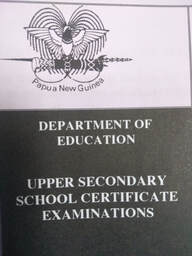Grade 12 Examination Topics , Units and Examination Specifications
 Grade 12 Examination Topics and units
Grade 12 Examination Topics and units
There are Sixteen (16) Examinable Subjects taught in Schools in Upper Secondary Schools in Papua New Guinea. These subjects must be taught and studied by teachers and students. It is also important that students studying in the upper secondary school study five (5) subject combinations in order for them to be eligible for examination and certification. For example, students studying Science may take , English, Advance Mathematics, Biology, Physics and Chemistry (you can see subject combinations for secondary schools here).
The Upper Secondary School has two (2) subject streams. These are the Arts Streams or sometimes called the Social Science Stream and the Science Stream.
Examinations for each stream are conducted at the end of completion of year 12. Below are the Examinable subjects and they are listed in their streams. (Follow the link for each subject to view the topic outlines).
The Upper Secondary School has two (2) subject streams. These are the Arts Streams or sometimes called the Social Science Stream and the Science Stream.
Examinations for each stream are conducted at the end of completion of year 12. Below are the Examinable subjects and they are listed in their streams. (Follow the link for each subject to view the topic outlines).
Science Subjects
There are five (5) science subjects taught and learnt at the upper secondary . Grade 12 Students sit for examinations and the end of the completion of their study. The science subjects are:
Language and literature or applied English is compulsory subjects for both science and arts stream.
- Biology Examination Topics and Units
- Chemistry Examination Topics and units
- Physics Examination Topics
- Applied Science Exam Topics
- Advance Mathematics Examination Topics and Units*
Language and literature or applied English is compulsory subjects for both science and arts stream.
Arts Subjects
There are seven (7) Arts subjects that are studied at the Upper Secondary Schools in Papua New Guinea. Grade 12 students who study arts subjects sit for the National Examination at the end of Grade 12. Below are the subjects taken by arts students.
- Economics Examination Topics and Units
- Business Studies Examination Topics and Units
- Accounting Examination Topics and Units
- History Examination Topics and Units
- Geography Examination Topics and Units
- Geology Examination Topics and Units
- Legal Studies Examination Topics and Units
- Information Communication Technology (ICT) Examination Topics and Units
- General Mathematics Examination Topics and Units
- Language and literature Examination Topics and Units
- Applied English Examination Topics and Units
Subjects Taught but not Examined - Internally assessed
There are several subjects that are taught at the Upper Secondary Schools but they are not examined. The assessment of those subjects are done internally by schools. These subjects are.
- Physical Education
- Agriculture
- Forestry
- Fishery
- Agriculture & National Resources Management
- Music
- Theatre Arts
- Visual Arts
- Design and Technology
- Practical Skills Technology
- Food Technology
- Textile Technology
- Tourism
- Computing
- Personal Development
- Religious Education
Grade 12 Examination Specification
The Examination Specification is a document used by the PNG Education Department to set National Examination for Grade 12s. It is a confidential document and it is not released to schools.
The Examination Specification mostly outline the following.
It is recommended that .
Usually, 3 multiple Choices questions and 1 Short Answer Question worth 7 marks are usually assigned to test each unit.
The Examination Specification mostly outline the following.
- Allocation of questions for topic and units
- The difficulty level of each questions
- The use of Blooms taxonomy
It is recommended that .
- Teachers must teach all the topics in all the units covered in Grade 11 and 12.
- Students must study all the topics and units prescribed in the syllabus
Usually, 3 multiple Choices questions and 1 Short Answer Question worth 7 marks are usually assigned to test each unit.



